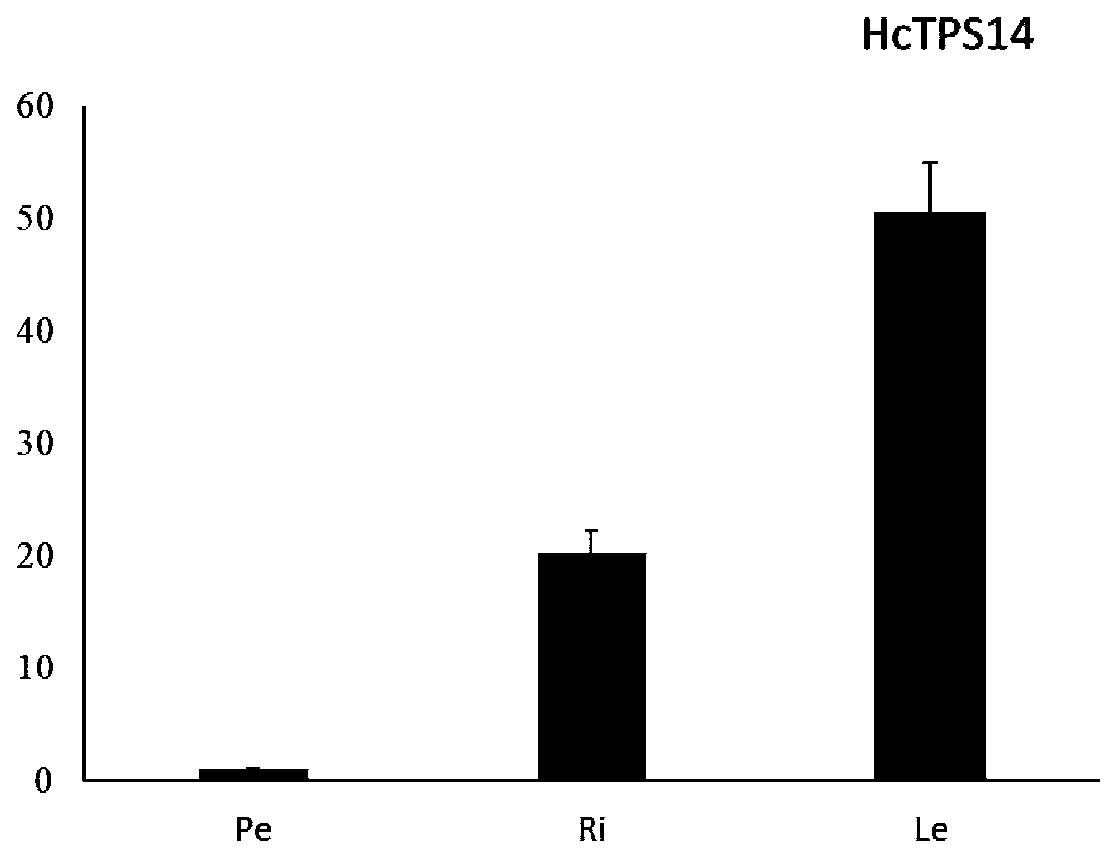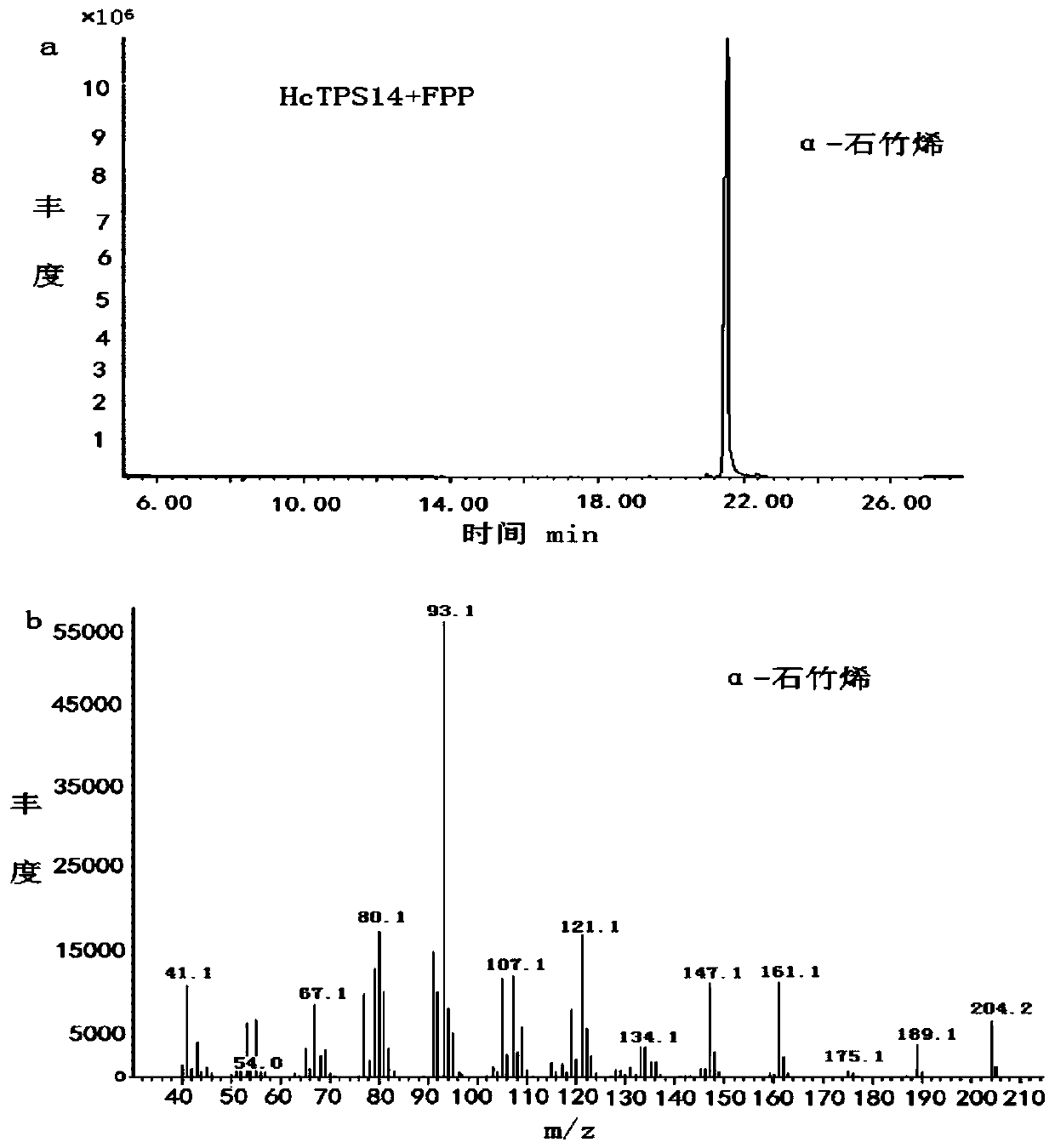Hedychium coronarium sesquiterpene synthetase gene HcTPS14 and application thereof
A technology of sesquiterpene synthase and sesquiterpene, which is applied in the field of genetic engineering and can solve problems such as few reports
- Summary
- Abstract
- Description
- Claims
- Application Information
AI Technical Summary
Problems solved by technology
Method used
Image
Examples
Embodiment 1
[0029] Example 1 Obtaining of full-length cDNA of HcTPS14 gene
[0030]S1. Extraction of RNA from the leaves of Gingerflower: the leaves of Gingerflower preserved in ultra-low temperature refrigerators were used as materials for extracting RNA. Pipette tips and Eppendorf tubes used for RNA extraction were soaked in 0.1% DEPC overnight at 37°C and then sterilized at 121°C for 25 minutes. Glassware and mortars were wrapped in aluminum foil and then dry-heated at 180°C for 3 hours. Cooled and set aside. The total RNA of ginger flower leaves was extracted by Trizol method according to the instructions of Trizol (TaKaRa). The integrity of RNA was detected by 1% agarose gel electrophoresis, and its concentration and purity were determined by micro-spectrophotometer. Store at -80°C for later use.
[0031] S2. The total RNA of ginger flower leaves was used as a template, and the first-strand cDNA was synthesized with Sangon's M-MuLV First cDNA Synthesis Kit. According to the annota...
Embodiment 2
[0033] Example 2 Expression analysis of HcTPS14 gene
[0034] 1. Select different tissue parts and leaves of different developmental stages of ginger flower to extract RNA. Trizol method (TaKaRa) is used for RNA extraction, and SYBR green (TaRaKa) method is used for fluorescence quantitative PCR. The specific principle of dye method is shown in the instruction manual. Using Primer Premier 5.0 software to design real-time fluorescent quantitative PCR primers, according to the principles of fluorescent quantitative PCR primer design, use Primer premier 5.0 to design primers respectively, and detect whether there are mismatches or primer dimers and their amplification efficiency by fluorescent quantitative PCR. A pair of optimal primers was selected, P1: 5'-ATCCAACAGCAGTAGCTCGAC-3' (as shown in SEQ ID NO:6). P2: 5'-GGTTCAACCAGCACCAAAGA-3' (shown in SEQ ID NO: 7). The internal reference gene RPS was designed with Primer premier 5.0 according to the design principles of Real-time ...
Embodiment 3
[0037] Example 3 Prokaryotic expression of HcTPS14 gene
[0038] S1. Vector construction: according to the coding region of the obtained HcTPS14 gene, use the specific primer F: 5'-GATCTG comprising KpnI and EcoRI restriction sites GGTACC ATGATAAAGAGAGTGGAAGA-3' (as shown in SEQ ID NO: 10); R: 5'-GAGCTC GAATTC TATAGGAATGGGTTCAACCAGCA-3' (shown as SEQ ID NO: 11). Perform PCR amplification. The PCR product was recovered with a Takara recovery kit, and the recovered product was directly digested with KpnI and EcoRI restriction endonucleases, and the target fragment was recovered on 1% agarose gel. The pET-30a prokaryotic expression vector was double-digested with KpnI and EcoRI restriction enzymes to recover large fragments on 1% agarose gel. After ligation at 16°C overnight, the ligation product was transformed into Escherichia coli (E.coli) DH5α competent cells; the recombinant prokaryotic expression vector was obtained after the extracted plasmid was identified by enzyme ...
PUM
 Login to View More
Login to View More Abstract
Description
Claims
Application Information
 Login to View More
Login to View More - R&D Engineer
- R&D Manager
- IP Professional
- Industry Leading Data Capabilities
- Powerful AI technology
- Patent DNA Extraction
Browse by: Latest US Patents, China's latest patents, Technical Efficacy Thesaurus, Application Domain, Technology Topic, Popular Technical Reports.
© 2024 PatSnap. All rights reserved.Legal|Privacy policy|Modern Slavery Act Transparency Statement|Sitemap|About US| Contact US: help@patsnap.com










